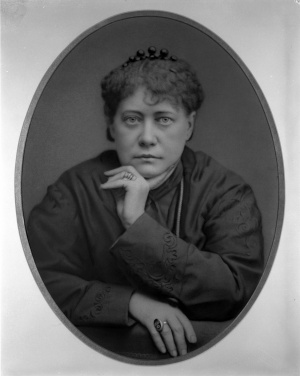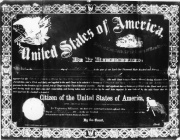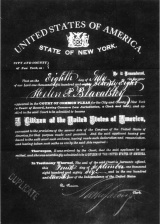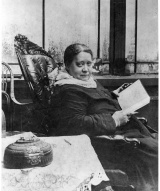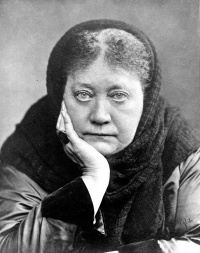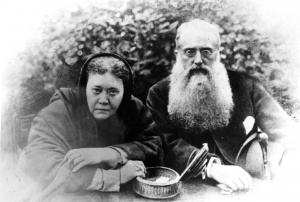Helena Petrovna Blavatsky: Difference between revisions
Pablo Sender (talk | contribs) No edit summary |
Pablo Sender (talk | contribs) No edit summary |
||
| Line 143: | Line 143: | ||
===Additional resources=== | ===Additional resources=== | ||
*[http://www.theosophy-nw.org/theosnw/theos/hpb-selc.htm# H. P. Blavatsky - Theosophical Topics in Depth] Links to articles, letters, and books on and by HPB | *[http://www.theosophy-nw.org/theosnw/theos/hpb-selc.htm# H. P. Blavatsky - Theosophical Topics in Depth] Links to articles, letters, and books on and by HPB | ||
*[http://www.blavatsky.net/gen/refute/refute.htm# Refutation of charges against Madame Blavatsky at Blavatsky Net | |||
== Notes == | == Notes == | ||
Revision as of 15:50, 1 February 2013

Helena Petrovna Blavatsky (Russian: Еле́на Петро́вна Блава́тская, Ukrainian: Олена Петрівна Блаватська), was born at Dnepropetrovsk (Ekaterinoslav), Ukraine, on August 12, 1831. She was a Theosophist, writer, and traveler. Between 1848 and 1875 Blavatsky went around the world three times. In 1875 Blavatsky, together with Colonel H. S. Olcott, established the Theosophical Society. Blavatsky was the main source of Theosophical teachings and discussed the major themes of Theosophy in many articles and several major works, including Isis Unveiled, The Secret Doctrine, The Key to Theosophy, and The Voice of the Silence. She died in London, on May 8, 1891.
Early years
Born as Helena von Hahn (Russian: Елена Петровна Ган, Ukrainian: Олена Петрівна Ган) she was the daughter of Colonel Peter Alexeyevich von Hahn and novelist Helena Andreyevna (née de Fadeyev).
On July 6, 1842 Helena Andreevna Hahn, Helena’s mother and at that time a well-known writer, died at the age of 28 of galloping consumption.
According to Vera Jelihovsky, Helena's mother, at the time, was worried about the destiny of her elder daughter, “gifted from childhood by outstanding features”.[1] Before her death, her mother said: “Well! Perhaps it is for the better that I am dying: at least, I will not suffer from seeing Helena’s hard lot! I am quite sure that her destiny will be not womanly, that she will suffer much”.[2]
After her mother’s death, Helena’s grandfather Andrei Mikhailovich and Grandmother Helena Pavlovna had taken the children to Saratov, where they had quite a different life. Fadeyev’s house was visited by Saratov’s intellectuals.
Marriages
Striving for full independence in 1849, at Tiflis, 16-year old Helena married vice-governor of Erevan Nikifor Vladimirovich Blavatsky, who was much older than her. On June 7, 1849 their wedding ceremony took place. Soon after their wedding, Helena escaped from the husband and returned to her relatives.[3] Nikifor Blavatsky tried to obtain a divorce on the ground that "his marriage had never been more than a form." His attempt failed, however, owing to the fact Russian law at the time regarded divorce with disfavor. It is not certain when Nikifor died. In Helena's scrapbook there is a cutting from a newspaper talking about her life, where we find the sentence: "For many years they [Helena and Nikifor] resided together at Odessa, and finally a legal separation was affected." To this, HPB added two notes. The one commenting on her stay with her husband "for many years" said: "a lie—was with him but for three weeks." To the second phrase: "finally a legal separation was affected" she added "legal, because he died." The name and date of the newspaper do not appear in print, but H.P.B. wrote in ink above the cutting: "From the N. Y. Mercury, Jan. 18, 1875."[4]
On April 3, 1875, in New York, a few months before founding the Theosophical Society, Mme. Blavatsky married with a Georgian living in America Michael Betanelly. The marriage broke after several months and Betanelly sued for a divorce. The divorce was granted on May 25, 1878, with William Q. Judge acting as Blavatsky's counsel.
American citizenship
On July 8, 1878, "Helen P. Blavatsky" appeared in the Court of Common Pleas in New York City and completed the process of applying for citizenship in the United States.
Travels
Shortly after her marriage Helena began more than 20 years of extensive travel, bringing her into contact with mystic traditions the world over. This period of Blavatsy’s life is difficult for her biographers as she did not keep diaries and there was nobody with her to tell about these events. The picture of the route and course of the travels is based mainly on Blavatsky’s own memories, which sometimes contain the chronological contradictions. N. A. Fadeyeva reported that only her father knew where his daughter was, and from time to time would send money to her.
1849/50: Left her husband and travelled in Turkey, Greece, Egypt and France
1851: Met the man who was to her guru in London (always referred to as 'Master')
1851: Sailed for Canada, travelled south to New Orleans, Mexico and South America
1852: From the West Indies sailed via the Cape and Ceylon to India
1852: Attempted unsuccessfully to enter Tibet
1853: Travelled via Java to England
1854: Returned to America, crossing The Rockies with a caravan of emigrants
1855: Returned to India via Japan and The Straights
1856/57: Travelled throughout India, Kashmir, Ladakh, Burma, and parts of Tibet
1858: Returned to Russia via Java, France and Germany
1860/65: Lived with the native tribes in the Caucasus
1866/67: Travelled in the Balkans, Egypt, Syria and Italy
1867: Wounded at the Battle of Mentana in Italy
1868: Returned to India and Tibet
1871: Shipwrecked off the island of Spetsai sailing from Greece to Egypt
1871/72: Lived in Cairo
1872: Travelled through Syria, Palestine, the Lebanon, and back to Odessa
1873: Lived in Paris and sailed to the USA.
Founding of the Theosophical Society
In 1873, in Paris, she received an order from her Master to go to the United States and meet with Col. Henry S. Olcott, who was now about to become a journalist, reporting on spiritualistic phenomena. It was in this capacity that, a year later, he met Mme. Blavatsky, and they quickly became friends.
As she began to instruct Col. Olcott in the occult science and esoteric philosophy, the two started working together in connection with the Spiritualistic movement in the US. During this time, HPB performed at will many phenomena normally ascribed to “the spirits,” and published articles in different spiritualistic journals explaining the origin and nature of these psychic incidents, in ways that contradicted many of the Spiritualists' theories. Most spiritualists were not pleased with HPB’s attempt to reform, sometimes quite radically, their believes.
In July 1875, HPB wrote in her scrapbook: "Orders received from India direct to establish a philosophico-religious society and choose a name for it, also to choose Olcott."[5] In the Fall of the same year, along with H. S. Olcott, W. Q. Judge, and others, the Theosophical Society was founded.
Writing of Isis Unveiled
H. P. Blavatsky's first major literary effort was Isis Unveiled, a critical response to the growing materialism in both scientific and religious institutions, is a vindication of the ageless quest. The book was started in 1875, a few months before the formation of the Theosophical Society, although at the time HPB did not know what was to become of the growing pile of manuscripts.
Described as "A Master-Key to the Mysteries of Ancient and Modern Science and Theology," the book was published in two volumes in 1877, quickly becoming a classic in occult literature. Two large editions of this "epoch-making" work were sold immediately, and new editions have been appearing ever since.
Moving to India
The Hodgson Report
Writing of the Secret Doctrine
Her work in England
Death
For online resources of Helena Petrovna Blavatsky's writings see Blavatsky writings.
Online resources
Articles and pamphlets
- H. P. Blavatsky in Theosopedia.
- Blavatsky and Mount Rushmore by John Algeo
- H. P. Blavatsky - the Light-Bringer by Geoffrey A. Barborka
- The Theosophical Society and H.P.B. by Annie Besant and H.T. Patterson
- The Truth About Madame Blavatsky by Walter A. Carrithers, Jr.
- The Esoteric She by William Q. Judge
- H.P.B. - A Lion-Hearted Colleague Passes by William Q. Judge
- H.P.B. at Enghien by William Q. Judge
- H.P.B. Was Not Deserted by the Masters by William Q. Judge
- "Yours Till Death and After, H.P.B." by William Q. Judge
- Address Read at the Cremation of HPB's Body by G. R. S. Mead
- A Message Ahead of Its Time by Hugh Shearman
- Against Blavatsky: Rene Guenon's Critique of Theosophy by Richard Smoley
Books
- Reminiscences of H.P. Blavatsky and The Secret Doctrine by Countess Constance Wachtmeister
Audio
- The Real Madame Blavatsky by John Algeo
- Olcott and Blavatsky: Theosophical Twins by John Algeo
- H. P. Blavatsky Remembered: White Lotus Day Commemoration by David Bruce
- The Life of HPB Boris de Zirkoff
- H. P. Blavatsky: Woman of Mystery by Stephan Hoeller
Video
Additional resources
- H. P. Blavatsky - Theosophical Topics in Depth Links to articles, letters, and books on and by HPB
- [http://www.blavatsky.net/gen/refute/refute.htm# Refutation of charges against Madame Blavatsky at Blavatsky Net
Notes
- ↑ Желиховская. Е. П. Блаватская. II. С.246.
- ↑ Jelihovsky. Helena Petrovna Blavatsky // Lucifer. C.204; The Theosophist. C. 240
- ↑ исьмо А. М. Дондукову-Корсакову от 1 марта 1882 года // Блаватская Е. П. «Письма друзьям и сотрудникам». Сборник. Перев. с англ. — М., 2002. — С. 250 ISBN 5-93975-062-1
- ↑ Blavatsky, H. P., Collected Writings vol. I (Wheaton, Ill: Theosophical Publishing House, ???), 54.
- ↑ Caldwell, Daniel H. The Esoteric World of Madame Blavatsky (Wheaton, Ill., Quest Books, 2001), 71
